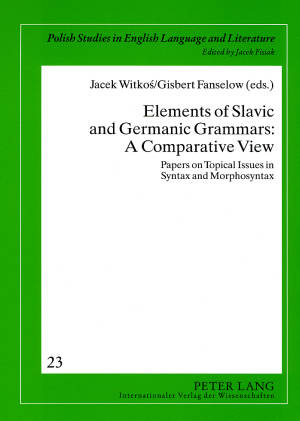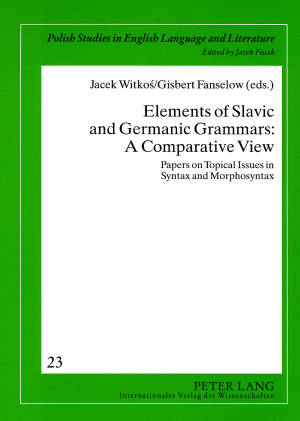
- Afhalen na 1 uur in een winkel met voorraad
- Gratis thuislevering in België vanaf € 30
- Ruim aanbod met 7 miljoen producten
- Afhalen na 1 uur in een winkel met voorraad
- Gratis thuislevering in België vanaf € 30
- Ruim aanbod met 7 miljoen producten
Zoeken
Elements of Slavic and Germanic Grammars
A Comparative View: Papers on Topical Issues in Syntax and Morphosyntax
€ 87,45
+ 174 punten
Omschrijving
This book is a collection of papers on various aspects of the syntax and morphosyntax of Germanic and Slavic languages (English, German, Czech, Polish, and Russian), stemming from the Syntax Session of the 2006 PLM conference in Poznań (Poland). Gisbert Fanselow and Caroline Féry discuss lack of Superiority with German movement; Gereon Müller links pro-drop to non-impoverished inflectional morphology; Christopher Wilder deals with English constructions with a directional locative and imperative; Adam Bialy decomposes event structure; Katarzyna Sówka analyses the semantics of German verbs of giving; Ewa Bulat takes a fresh look at null subjects; Helen Trugman presents the distribution of adnominal adjectives in Russian; Agnieszka Pysz explores the same issue in Old English; Bożena Cetnarowska employs OT to describe possessives in Polish; Katarzyna Miechowicz-Mathiasen and Pawel Scheffler compare Polish and Italian reversible verbs; Radek Simik describes different relative pronouns in Czech; Mojmir Dočekal discusses lack of WCO effects in Czech; Michael Moss argues for a complex structure of the Polish clause, and Jacek Witkoś demonstrates that control-as-movement penetrates CPs.
Specificaties
Betrokkenen
- Uitgeverij:
Inhoud
- Aantal bladzijden:
- 282
- Taal:
- Engels
- Reeks:
- Reeksnummer:
- nr. 23
Eigenschappen
- Productcode (EAN):
- 9783631578575
- Verschijningsdatum:
- 22/05/2008
- Uitvoering:
- Paperback
- Formaat:
- Trade paperback (VS)
- Afmetingen:
- 148 mm x 210 mm
- Gewicht:
- 340 g

Alleen bij Standaard Boekhandel
+ 174 punten op je klantenkaart van Standaard Boekhandel
Beoordelingen
We publiceren alleen reviews die voldoen aan de voorwaarden voor reviews. Bekijk onze voorwaarden voor reviews.










